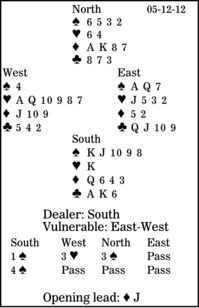Bridge column, May 12: Snipping away at their tricks

That would not sit well with many people, but it would help declarer in this deal.
How should South try to make four spades? West leads the diamond jack.
After South opened one spade and West made a three-heart weak jump overcall, North's three-spade response indicated a respectable single raise. (With a game-invitational limit raise, he would have jumped to four spades, and with a game-forcing raise, he would have control-bid four hearts.)
East thought about bidding four hearts but did not expect that contract to make. (Four hearts doubled would go down one.) And he had potential defense against four spades.
West found the best lead with the diamond jack.
A tempting line is to win in the dummy, play a spade to the jack, return to dummy with a diamond, and call for another trump. However, here East could win with his ace, play a heart to his partner's ace and receive a diamond ruff. A later club trick would result in down one.
How would West know to give the ruff, not try to cash a second heart trick?
Because East played high-low in diamonds to advertise his doubleton.
Since the diamond ruff is a definite risk, after winning the second trick with his spade jack, declarer should lead his heart king to cut the communications between the defenders, a play called the Scissors Coup.
** ** **
COPYRIGHT: 2012, UNITED FEATURE SYNDICATE
DISTRIBUTED BY UNIVERSAL UCLICK FOR UFS

